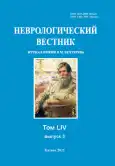Impairment of social cognitive functions in the patients with acute ischemic stroke
- Authors: Ozerova A.I.1, Kutlubaev M.A.1
-
Affiliations:
- Bashkir State Medical University
- Issue: Vol LIV, No 3 (2022)
- Pages: 21-26
- Section: Original study arcticles
- URL: https://journal-vniispk.ru/1027-4898/article/view/109614
- DOI: https://doi.org/10.17816/nb109614
- ID: 109614
Cite item
Abstract
BACKGROUND. Cognitive impairment is common after a stroke. However, the condition of social cognitive functions, in particular theory of mind, in this group of patients has been studied insufficiently.
AIM. To study the frequency and predictors of the development of the social cognitive disorders based on theory of mind impairment in patients with acute ischemic stroke.
MATERIAL AND METHODS. Theory of mind impairment was assessed using “Reading the Mind in the Eyes” test in the acute period of ischemic stroke. National Institutes of Health Stroke scale was used to assess the severity of neurological deficit, modified Rankin scale — the degree of disability, Delirium Severity Rating Scale — the symptoms of delirium, Buss Perry aggressiveness scale — severity of aggressive behavior, Montreal Cognitive Assessment Scale — cognitive deficit. The severity of cortical atrophy was evaluated by computed tomography of the brain. The study included 86 patients, 53 males and 33 females. The average age of patients was 64 years. Statistical analysis was performed using the IBM SPSS Statistics 21 software package. Nonparametric statistics methods were used. Binary data were compared using the chi-square parameter, categorical data were compared using the Mann–Whitney test.
RESULTS. Seventy percent of patients suffered from the impairment of social cognitive functions. Independent predictors of the impairment of theory of mind according to linear regression analysis were cognitive dysfunction according to the Montreal Cognitive Assessment Scale (p=0.0001) and the severity of cortical atrophy on computed tomography of the brain (p=0.001).
CONCLUSION. Social cognitive impairment is registered in a substantial number of patients in acute period of stroke; its predictors include general cognitive impairment and cortical atrophy of the brain.
Keywords
Full Text
##article.viewOnOriginalSite##About the authors
Anastasiya I. Ozerova
Bashkir State Medical University
Author for correspondence.
Email: LovingHeart1993@yandex.ru
ORCID iD: 0000-0003-0131-1524
SPIN-code: 6827-5675
postgraduate student
Russian Federation, UfaMansur A. Kutlubaev
Bashkir State Medical University
Email: mkmed@mail.ru
ORCID iD: 0000-0003-1001-2024
SPIN-code: 4713-0312
M.D., D. Sci. (Med.), Associate Professor
Russian Federation, UfaReferences
- Kutlubaev MA, Ozerova AI, Mendelevich VD. Disorders of social cognitive functions in patients after stroke. Zhurnal Nevrologii i Psikhiatrii imeni S.S. Korsakova. 2021;121(12(2)): 9–14. (In Russ.) doi: 10.17116/jnevro20211211229.
- Carter RM, Huettel SA. A nexus model of the temporal-parietal junction. Trends Cogn Sci. 2013;17(7):328–336. doi: 10.1016/j.tics.2013.05.007.
- Chimagomedova ASh, Liashenko EA, Babkina OV at al. Social cognitive function in neurodegenerative diseases. Zhurnal Nevrologii I Psikhiatrii imeni S.S. Korsakova. 2017;117(11): 168–173. (In Russ.) DOI: 10.17116/ jnevro2017117111168-173.
- Hatano S. Experience from a multicentre stroke register: a preliminary report. Bulletin World Health Organization. 1976;54(5):541–553.
- Rankin J. Cerebral vascular accidents in patients over the age of 60 II. Prognosis. Scottish Medical Journal. 1957;2(5):200–215. doi: 10.1177/003693305700200504.
- Spilker J, Kongable G, Barch C at al. Using the NIH Stroke Scale to assess stroke patients. The NINDS rt-PA Stroke Study Group. Journal of Neuroscience Nursing. 1997;29(6):384–392. doi: 10.1097/01376517-199712000-00008.
- Trzepacz PT, Mulsant BH, Dew MA et al. Is delirium different when it occurs in dementia? A study using the delirium rating scale. Journal of Neuropsychiatry and Clinical Neurosciences. 1998;10:199–204. doi: 10.1176/jnp.10.2.199.
- Trzepacz PT, Mittal D, Torres R et al. Validation of the delirium rating scale-revised-98 (DRS-R-98). Journal of Neuropsychiatry and Clinical Neurosciences. 2001;13:229–242. doi: 10.1176/jnp.13.2.229.
- Pendlebury ST, Markwick A, de Jager CA et al. Differences in cognitive profile between TIA, stroke and elderly memory research subjects: a comparison of the MMSE and MoCA. Cerebrovasc Diseases. 2012;34:48–54. doi: 10.1159/000338905.
- Lee S, Jacobsen EP, Jia Y at al. Reading the mind in the eyes: A population-based study of social cognition in older adults. American Journal of Geriatric Psychiatry. 2021;29(7):634–642. DOI: 10.1016.j.jagp.2020.11.009.
- Baron-Cohen S, Wheelwright S, Hil J at al. The “Reading the Mind in the Eyes” Test Revised Version: A study with normal adults, and adults with Asperger syndrome or high-functioning autism. Journal of Child Psychology and Psychiatry. 2001;42:241–251. doi: 10.1111/1469-7610.00715.
- Quilty LC, Robinson JJ, Rolland JP at al. The structure of the Montgomery–Asberg depression rating scale over the course of treatment for depression. International Journal of Methods in Psychiatric Research. 2013;22(3):175–184. doi: 10.1002/mpr.1388.
- Buss AH, Perry M. The aggression questionnaire. Journal of Personality and Social Psychology. 1992;63(3):452–459. doi: 10.1037/0022-3514.63.3.452.
Supplementary files





